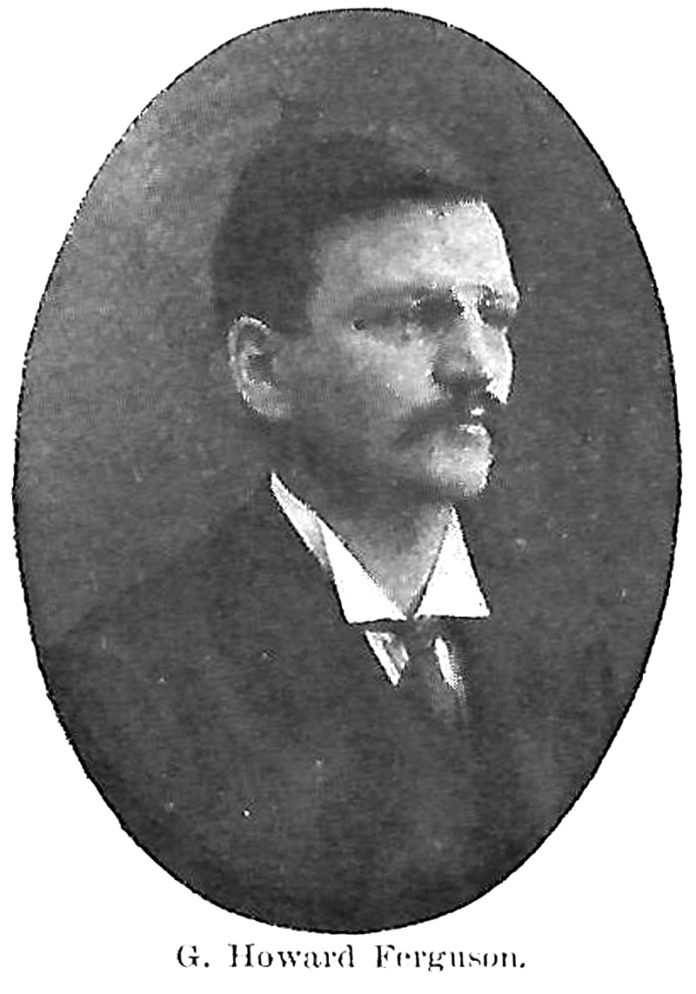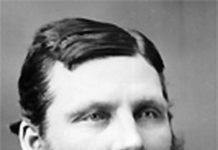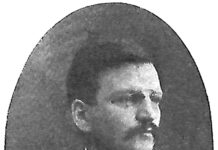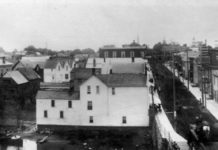George Howard Ferguson is, at the same time, one of North Grenville’s most famous and most unknown sons. This local boy made good was Ontario’s ninth Premier, and his achievements in that office had a lasting impact on the province, and 2023 marks the centenary anniversary of his election as Premier, a position he held until 1930. In appearance, the young Howard Ferguson looked like a banker; as he grew older, he resembled a genial uncle, or grandfather, with a round and beaming face. He served on the Village of Kemptville Council, and was Reeve of the village for three years (at that time, Councils were elected every year). When he became Premier in 1923, he had already established a solid political base in the area, and his re-election at each election was always, it seemed, an inevitability.
But there was quite a dark side to Ferguson’s political career, one that seems to be relatively unknown in North Grenville. Even his official biographer had a hard time putting a good face on aspects of his life in politics. The title of the biography says nothing about his achievements: it is simply called: “G. Howard Ferguson: Ontario Tory”. But perhaps that describes the core nature of Ferguson’s career. Chapters of the biography have titles such as “Tory Hatchet Man”, “Hides on the Fence”, and, most indicative of his role as Premier, “Boss Ferguson”.
Howard was always drawn to the wilder side of life. In his days at the University of Toronto, his room-mate was Stephen Leacock, who would become in the future a famous writer and humourist. The two ran the student newspaper and Howard was known as a man who enjoyed a good time with his friends. This led to a problem when it came to graduating. Howard and Stephen had to get one more credit, but their subject, Mathematics, was not by any means their strongest. Stephen discovered that they could get a credit in Ethnology instead, if they could pass the exam which was taking place the following day. The professor in the subject had written a textbook, so the two students read the book overnight and scrapped through to graduate on schedule.
Throughout his career, Ferguson gained a reputation of doing whatever it took to succeed, and of using friends and contacts to prosper. He was accused of being just a little too close to the timber and mining companies that had dealings with the Department of Mines and Forests when he was Minister, of deliberately courting controversy when he needed to raise his profile with the public. And this was not just the case with his provincial career. It was in Kemptville that Ferguson honed the many talents he took to the provincial scene. His time on the Kemptville Council was equally tempestuous: in fact, there have been very few times in this community’s history when local politics were as polarised. In fact, it was only in recent times that it came close to the depth of feeling and level of controversy that Ferguson inspired between 1898 and 1905.
Ferguson’s time on Council was a series of fights, injunctions, conflict and argument, in which Ferguson showed his qualifications to move up to provincial levels of political infighting. Then, having challenged the sitting MPP, a fellow Conservative, Ferguson was elected to the provioncial Legislature, but faced years of internal party conflict and opposition by the disgruntled ex-MPP, who claimed that illegal methods had been used to get Ferguson elected. In 1911, Ferguson suddenly introduced a motion in the Ontario Legislature that “no language other than English should be used as a medium of instruction in the schools of this Province”. It was the first time he made a name for himself, both in the Legislature and among the public at large. It was seen at the time to a be a rather crude attempt to gain support from the anti-French segment of the population and the Tory party, and this willingness to court controversy to further his own career was to become a trademark of his long and successful time in Ontario politics.
Howard Ferguson learned his trade in the cut and thrust of the Kemptville Village Council, not what you would consider the most dynamic political body, but made such by Ferguson’s drive and ambition. He became, as his biographer admits, the Tory Hatchet Man, the member his leader could depend on to get down in the mud and do what was necessary. Hardly the image you would want for your favourite uncle or grandfather, is it?









